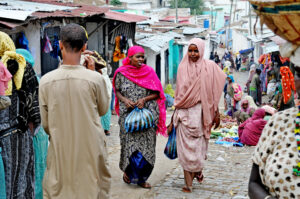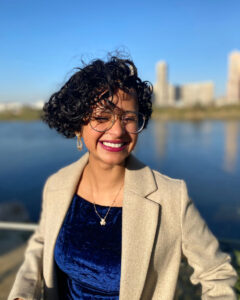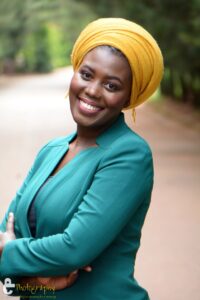“Those in power do not see the priority of {women’s} issues because they are not affected.”
These are the words of a Muslim women’s rights activist from Hargeisa, Somaliland, one of the over 40 other advocates interviewed during a four-month research mapping actors working on family law reform across the Greater Horn of Africa as part of Musawah’s Campaign for Justice in Muslim Family Laws. Muslim women on the African continent feel neglected as their lives are constantly a fight between their basic and fundamental rights and their religion. They are invisibilized by different, heavy layers of oppression and discrimination from the state, religious and cultural leaders, and men in their communities and families. Forced to make an impossible choice: they can either have their rights or be considered ‘pious Muslims.’ Their two identities are seen in opposition, and their unique lived realities are not recognized.
At the surface, the Greater Horn of Africa is a region of plural legal systems and diverse cultures that distinguish them from each other. They all, however, have contradictory sets of laws and customs that often leave Muslim women in a vulnerable legal status. A recent report by Musawah, the Global Movement for Equality and Justice in the Muslim Family, covering seven Greater Horn of Africa countries demonstrates the persistence of high rates of domestic violence, harmful practices like female genital mutilation/cutting, marital rape, and other forms of gender-based discrimination. These challenges are faced equally in Muslim-majority (Sudan, Somalia and Somaliland) and Muslim-minority (South Sudan, Ethiopia, Kenya and Uganda) countries.
Legal recourse is essential for prevention, as well as seeking justice. However, Muslim women face a complex reality as their lives are often left to the discretion of religious and traditional leaders and institutions rather than protections provided under civil or criminal laws.
Qadhi courts -also known as sharia or Islamic courts- are judicial institutions that aim to resolve legal disputes based on Islamic principles. In most cases, these courts operate informally and lack female representation. Here, we must first differentiate between two key concepts: sharia and fiqh. Used interchangeably in everyday language, the two words, in fact, represent two distinct knowledges and cannot be equated to state laws. Sharia, which in Arabic means a path, is the sum of religious values and principles that guide Muslim lives. Fiqh, on the other hand, is the human understanding of Sharia. While sharia is divine, fiqh is the process by which Muslim jurists can extract legal rulings from the sacred sources of religious knowledge in Islam. As a hu(man)-made understanding, fiqh then is subject to change.
“When sheikhs talk about the Quran, people keep quiet and are afraid to challenge them. {But} by speaking out, they are challenging these Sheikhs’ interpretation of the Quran, not the Quran itself,” echoed Yusuf Ahmed Abdi, a Human Rights Defender based in Somaliland.
Confusing sharia with fiqh upholds and leads to gender-based discrimination and inequality in Muslim communities. Many advocates we interviewed talked about the challenge of religious leaders, knowingly or unknowingly, perpetuating these inequalities in the name of upholding sharia, yet these are their own fiqh interpretations of religious text. Take the example of the lack of a minimum legal age of marriage in many countries in the region. In Sudan, child marriages for girls as young as 12 years are encouraged with the parents’ consent. Multiple attempts have been made to reform the Personal Status Act to increase the legal age of marriage, but religious leaders have rejected these proposals. It is important to note here that no Muslim family law is the same worldwide and that several Muslim countries have successfully set the minimum age of marriage at 18, based on varying interpretations, and to promote the best interest of the child.
With the lack of codified laws and the reality of informal sharia rulings, women’s willingness to report cases of violence decreases.
Moreover, even when Muslim women have access and can appeal to civil courts, fear of repercussions from their communities stops them from seeking justice outside of Islamic courts.
In response to similar challenges and pressures, recently in Uganda, a group of female Muslim lawyers filed a petition in the Constitutional Court, asking the court to direct the government to pass a law that formalises qadhi courts across the country. This highlights the need for a clear and transparent judicial system that is capable of enforcing its rulings and that facilitates Muslim women’s access to justice. Such a law in Uganda would mean protecting the needs of Muslim women who have the right to be recognized in the legal system in a manner that gives them the religious legitimacy they need while still maintaining an equal legal status that does not go against their fundamental and constitutional rights. If passed, the law would pave the way for a positive legal development that can be adopted in the rest of the region and continent.
Women’s visibility
The persistence of these inconsistencies and ambiguities begs the question: Who represents women in decision-making spaces and access to justice processes in all their diversity?
In Somaliland, almost 99% of the parliament comprises men. Although this is an extreme case, it highlights a bigger issue: how can women’s issues, needs, and realities be reflected in laws and policies when they are absent in the spaces and leadership roles? In the case of Muslim communities, how can we hope for laws and policies that prioritise their unique needs when they are absent from decision-making? Lack of political representation is not even indicative of women’s active role. Women are increasingly visible in political processes like elections, and women’s participation in voting is high. The absence in leadership is then indicative of deep patriarchal pressures on women. Many women face online harassment and threats, and there’s an overall lack of support towards women whose religious devotion is seen to be in contradiction with an active political role. Women’s roles remain limited to domesticated and private spheres, and they stay seen as ‘unreliable representatives’ in the public sphere.
“The biggest challenge that Muslim women advocates face when we speak out is attacks from male religious leaders, and some women who think its contrary to our religion to speak out against issues that affect Muslim women and girls,‘’ said Zabib Loro, the Executive Director of Women Justice and Equality (WOJE), a South Sudanese women’s rights organisation that works in Muslim communities.
WOJE handles cases of child sexual abuse in Muslim communities, religious leaders abuse of power and sexually abusing young girls in Madrasahs. When Zabib started doing this work, she experienced harassment and her online profile was targeted.
“We are sidelined, our Islam is questioned, and we do not even have friends in the community,” says Zabib. “People do not want to be seen associating with us because of the work we do. Some of us suffer abuse from our partners who are not comfortable with our work, with little to no platforms to seek help or justice.” Zabib added that “Many women cannot publicly and authoritatively talk about issues such as sexual abuse, marital rape, early marriage, and any other topics concerning the protection of our own bodies,” she added.
Like Zabib, Muslim women advocates working on such sensitive issues in the community are intimidated and told they are disrespecting Islam. Social pressures and challenges include questions about Muslim women’s piety and suitability as mothers, shaming them for ‘disrespecting’ Muslim religious authorities, or even refusing to work or collaborate with them at all. For example, colleagues from the Ethiopian Women Lawyers Association (EWLA) shared how some religious leaders have sidelined their efforts to create awareness about family law reform.
Hanna Ahmed Ziyad, a Legal Aid Coordinator in Jigjiga, narrated an incident where sheikhs walked out of a training they had organised for religious authorities. “They told us that they do not meet with females; that men meet with fellow men and the women meet the women,” said Hanna.
Changing this hostile legal and community environment can only happen with the active participation of women in religious and political leadership roles. For this to happen, the laws and practices governing the domestic sphere must also change. This year marks the 30th anniversary of the International Year of the Family, which can be a starting point for reforming discriminatory family laws at national, regional, and global levels. This call has already been adopted by eight leading women’s rights, human rights, and faith-based organisations united under The Global Campaign for Equality in Family Law (GCEFL). Through building this global coalition, the campaign is building a global voice demanding equality in the family and is calling for the reform of discriminatory family laws, policies, and practices regardless of both religion and culture.

On the continent, the Africa Family Law Network is building on that effort to champion a regional movement seeking equality in family laws within customary, civil, and religious systems in line with regional and international human rights standards.
Muslim women human rights defenders continue to express their concerns in carrying out gender-related work. They are morally shamed and vilified as betrayers of their religion, and in extreme cases, can face detention and physical and sexual violence. Advocates, feminists, and human rights defenders need more funding and capacity strengthening to increase their knowledge and practice of legal and holistic security; law and policymakers must listen and act on addressing these risks through stricter policies that prioritise women and girls’ safety and wellbeing, and through reforming existing discriminatory laws and practices. Laws, regulations, customs, and practices that do not consider women equal citizens, both in law and practice, must be abolished. In responding to the diverse needs of different populations, Muslim communities must be highlighted.
Religion has long been used as a weapon to discriminate against girls and women, but Muslim women have the knowledge and are already organising, speaking out, and demanding reform. Grounded in their lived realities, their voice is clear: the time for change and equality is now.
Feature photo: Claudiovidri / Shutterstock.com

Mariam Diefallah is a feminist doula, writer and educator from Egypt. She currently works as the Advocacy Communications Lead at Musawah.
 Rehema Namukose is a youth and women’s rights advocate and campaigner from Uganda. She is the Senior Regional Officer for the Sub-Saharan Africa Programme at Musawah.
Rehema Namukose is a youth and women’s rights advocate and campaigner from Uganda. She is the Senior Regional Officer for the Sub-Saharan Africa Programme at Musawah.

Amazing piece…eye opening of the reality in the region.